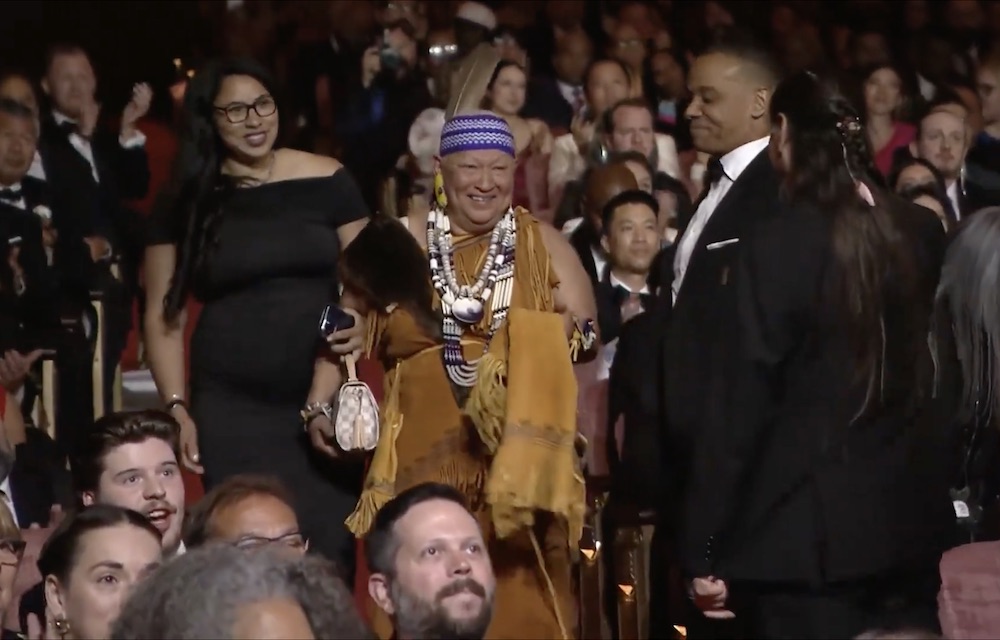
- Details
- By Kaili Berg
Dressed in traditional Native American clothing and with tears in her eyes, Sherry Pocknett made history as the first indigenous woman to win a James Beard Award for culinary excellence.
A member of the Mashpee Wampanoag Tribe, Pocknett was announced as the Best Chef Northeast on Monday night at the annual awards ceremony at the Lyric Opera of Chicago. Called “the Oscars of the food world,” the Beard Awards are recognized as one of the most prestigious honors in the culinary industry, highlighting excellence and contributions that chefs make to their communities.
Pocknett creates Indigenous cuisine that comes from her Wampanoag culture at her restaurant, Sly Fox Den Too, located at 4349 South County Trail in Charlestown, Rhode Island. The restaurant has developed a reputation for its foraged, fished, and hunted foods, including venison, rabbit, quahogs, fish, and fresh vegetables and herbs.
Prior to starting Sly Fox Den Too, Pocknett was the food and beverage director at the The Mashantucket Pequot Museum & Research Center. During her time there, she overhauled the menu from hamburgers and hot dogs to traditional Native foods such as turtle soup, bluefish and venison.
Pocknett is a first-time nominee for the Beard award and the second Native American to win a national Beard award in the past two years. Owamni, an Indigenous-owned restaurant in Minneapolis founded by Sean Sherman (Oglala Lakota) and Dana Thompson (Mdewakanton Dakota, Wahpeton Sisseton), was honored as the best new restaurant in 2022.
Sherman was in attendance at the Beard awards this year, greeting Pocknett with a congratulatory hug as she walked down the aisle to accept her award.
On stage, Pocknett gave an emotional speech, saying she represented all the northeastern tribes and never expected the honor of receiving the Beard award.
She also revealed to the audience she is battling breast cancer, and that she recently completed chemotherapy and will undergo surgery soon.
"I'm just waiting for all that to be over, to get on with it," she told CT Insider in an interview after the award ceremony. "I just want to cook, I just want to create. I just want people to know that Wampanoag people are here, and we're not going anywhere. We're still cooking, we're still moving and grooving and winning James Beard awards."
More Stories Like This
Vision Maker Media Honors MacDonald Siblings With 2025 Frank Blythe AwardFirst Tribally Owned Gallery in Tulsa Debuts ‘Mvskokvlke: Road of Strength’
Zuni Youth Enrichment Project and Partners at Ho’n A:wan Productions Launch 8th Annual Delapna:we Project
Chickasaw Holiday Art Market Returns to Sulphur on Dec. 6
Center for Native Futures Hosts Third Mound Summit on Contemporary Native Arts
Help us defend tribal sovereignty.
At Native News Online, our mission is rooted in telling the stories that strengthen sovereignty and uplift Indigenous voices — not just at year’s end, but every single day.
Because of your generosity last year, we were able to keep our reporters on the ground in tribal communities, at national gatherings and in the halls of Congress — covering the issues that matter most to Indian Country: sovereignty, culture, education, health and economic opportunity.
That support sustained us through a tough year in 2025. Now, as we look to the year ahead, we need your help right now to ensure warrior journalism remains strong — reporting that defends tribal sovereignty, amplifies Native truth, and holds power accountable.
 The stakes couldn't be higher. Your support keeps Native voices heard, Native stories told and Native sovereignty defended.
The stakes couldn't be higher. Your support keeps Native voices heard, Native stories told and Native sovereignty defended.
Stand with Warrior Journalism today.
Levi Rickert (Potawatomi), Editor & Publisher

